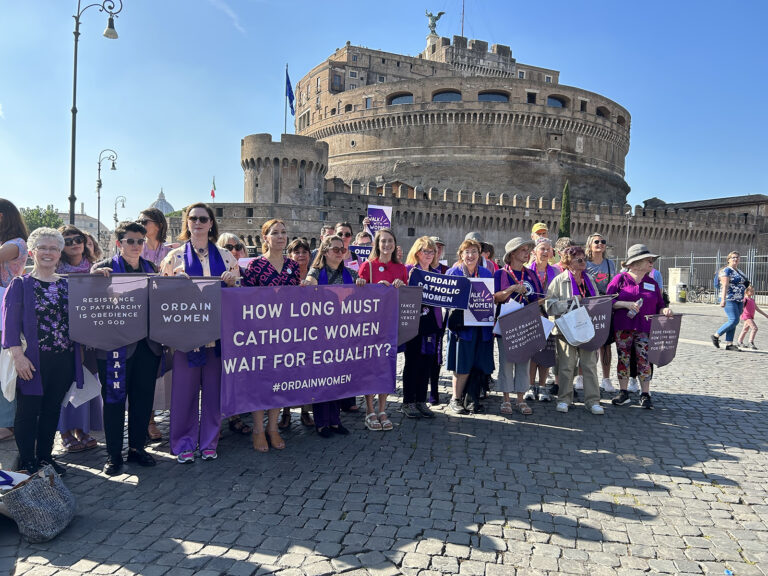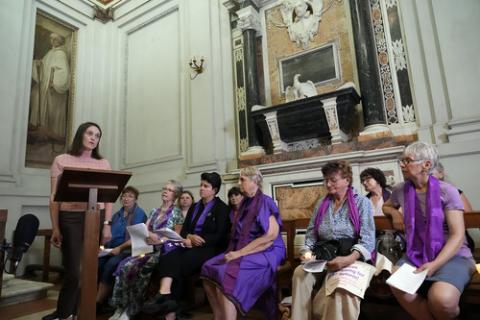
Dozens of women march to the Vatican, Oct. 6, 2023, calling for female ordination. (RNS/Tom Reese)
Despite what appeared to be a rigid no from Pope Francis to the idea of ordaining Catholic women deacons during the pontiff’s interview with CBS News on Monday (May 20), Catholic advocates for the prospect of women deacons in the church remain hopeful.
In the interview, which took place April 24, Francis told CBS anchor Norah O’Donnell that he was not open to the possibility of ordaining women deacons.
When O’Donnell asked Francis, "For a little girl growing up Catholic today, will she ever have the opportunity to be a deacon and participate as a clergy member in the church?" Francis responded, "No."
"Women have always had, I would say, the function of deaconesses without being deacons, right? Women are of great service as women, not as ministers, as ministers in this regard, within the holy orders," said Francis, referring to the sacrament of ordination.
Those who have been working to see women deacons become a reality expressed surprise and dismay at the interview, given the pope’s past statements and the evolution of the issue under his pontificate from a wish to a matter of study.

Women’s Ordination Conference Executive Director Kate McElwee, left, addresses conference members during the “Let Her Voice Carry” vigil in the Basilica of St. Praxedis in Rome, Oct. 3, 2023. (AP/Gregorio Borgia)
"I was quite devastated to see his response," said Kate McElwee, executive director of the Women’s Ordination Conference, which, unlike several other groups pushing for female deacons, also advocates for women’s ordination as priests and bishops. McElwee said that while Francis has previously had a "closed door" stance on women’s ordination to the priesthood, it was a surprise to see the pope extend that to the diaconate.
"It’s a very sad day when a powerful man like a pope tells a young girl that they can’t, or will never be equal in their own church and will never be able to follow their call from God," McElwee said, adding that the names of women and girls who have experienced a vocation to ordained ministry flashed through her mind when the pope made his reply.
Women who say they have had a call to the diaconate have said that the exclusion of women from ordained ministry has caused them deep pain.
Tricia Bruce, a sociologist and author of "Called to Contribute," a study of Catholic women and the diaconate, said that in the interviews she conducted, "deeply committed Catholic women who wish to serve the church in their fullest capacity and yet feel and hear this continual message of the door being closed and not being able to respond to that sense of call and vocation" described their lament and pain.
Bruce, who emphasizes that she is a sociologist who studies Catholics’ attitudes, not an advocate, said her study found that young women in ministry expressed "optimism and revival and hope and deep faith that the church will come to acknowledge and see as equal women’s gift in the church." Older women, however, felt "sadness and disappointment because they, as younger women, held on to that same hope."
Francis has entertained the question of women deacons for most of his pontificate. In 2016, in response to a challenge from a group of Catholic sisters meeting in Rome, he appointed a commission to study the history of women deacons. In April 2020, he set up a second commission focused on the possibility of restoring what advocates argue was an ancient role for women in the church.
In the weeks before Francis spoke to CBS, the Vatican announced that the issue of women deacons had been assigned to one of 10 study groups examining controversial issues that will report at the October 2024 meeting of the Synod on Synodality, and again in July 2025.
Phyllis Zagano, a Religion News Service columnist and senior research associate at Hofstra University who served on the first commission on women deacons, expressed concern about the comment’s impact on the synod in an email. "Surely Pope Francis did not intend to shut down several decades of study and ignore the import of Spirit-led discernment, which he has been so keen to emphasize as the modus operandi of the Catholic Church," she wrote.
Casey Stanton, co-director of the advocacy group Discerning Deacons, also read the pope’s comments as at odds with the synod. "Our church is in the middle of this three-year consultative process that he initiated to try to help transform the culture of the church from kind of unilateral, top-down decision-making towards listening and co-responsibility," she said.
"If his mind is already made up, then what does that mean for the unfolding process?" Stanton asked.
But advocates for women deacons do not consider the conversation over. Bruce, who in February was appointed as a consultant to the Vatican’s General Secretariat of the Synod, agrees.
Bruce said that instead of "shutting down the conversation" of women deacons, the pope may be instead "naming a moment."
"His response to me strikes as one that honors the current form and structure of the church," Bruce said, adding, "I have a deep appreciation for Pope Francis’ willingness to engage in open conversation and communication."
Bruce said the synod cannot be pinned on "one moment or one person," but that it is an "ongoing project of discernment."
Deacon Federico Guillermo "Memo" Rodriguez, a facilitator of diaconate formation for the Archdiocese of Los Angeles, said he already sees women doing diaconal work. Catholic women’s desire to serve as ordained deacons "is not different from what men experience and discern themselves," he said.
Rodriguez, who is affiliated with Discerning Deacons, pointed out that the permanent diaconate — as opposed to the short-term status that is a step before becoming a priest — was only reinstated a little more than 50 years ago. "That’s virtually yesterday in church times, so the church is still rediscovering" who deacons are, he said.
Advocates for women deacons often point to St. Phoebe, mentioned in St. Paul’s Letter to the Romans, as biblical proof of female deacons in the early church.
Advertisement
Stanton speculated that the pope might be resisting the cause of women deacons as part of his fight against clericalism, the term for the idea that ordained clergy are superior to the laity, which Francis has called a "scourge on the church."
"We in Discerning Deacons share this profound sense that our baptism grounds us, and that is the root of our discipleship," she said, but she challenged the pope to listen to and believe women in the church. "We’re just actually asking for sacramental grace to strengthen us in hard ministry," said Stanton, who counts herself among women who feel a call to the diaconate.
"We’re trying to be ordained so we can go minister in the prison. We’re trying to be ordained so we can go visit folks, our parishioners in immigration detention centers. And you just actually need to be ordained to get on the visitation list," Stanton said.
Stanton, the mother of three, said that ordaining moms as deacons would serve as a hedge against clericalism. "Children keep you humble," she said.
"I wonder if Pope Francis has not yet had an encounter with women who sense a call, a real vocation to be ordained as deacons," Stanton added. Though known as a pastoral pope, Francis, surrounded by theological arguments, may not be "immersed in the pastoral reality."
McElwee similarly said that Francis’ "lack of pastoral care when it comes to women is always shocking." The Women’s Ordination Conference, she said, is advising "for Pope Francis to sit down and really listen to the stories of women who have sincerely discerned calls to ordination."
McElwee said she and her team were most immediately attending to the needs of members who feel disappointment, betrayal, anger and sadness, but they planned to continue their work.
"My hope really comes from the resolve and determination of women who sincerely discern a call to ordained ministry and against all odds, claim it, proclaim it, and hold onto it," McElwee said. "Bringing equality into the Catholic Church would just have such a huge effect around the world."
Rodriguez, a deacon at St. Paschal Baylon Catholic Church in Thousand Oaks, California, stressed that Francis’ comments were made in a news interview. "It’s not official church documents that the pope was issuing," he said. "It’s not immediately clear if this was his opinion, his teaching, his position. It needs clarification."
Rodriguez called on Catholics to continue to discern women’s calls to ministry while listening to Francis’ teaching authority, regardless of what answers are given about women deacons.
With the church, "a negative answer right now can be a negative answer for a long time, or it can be a negative answer until the right time comes, and that’s part of discerning," Rodgriguez said.
"The priority here is to serve the people of God in communion with the Catholic Church," he said.








